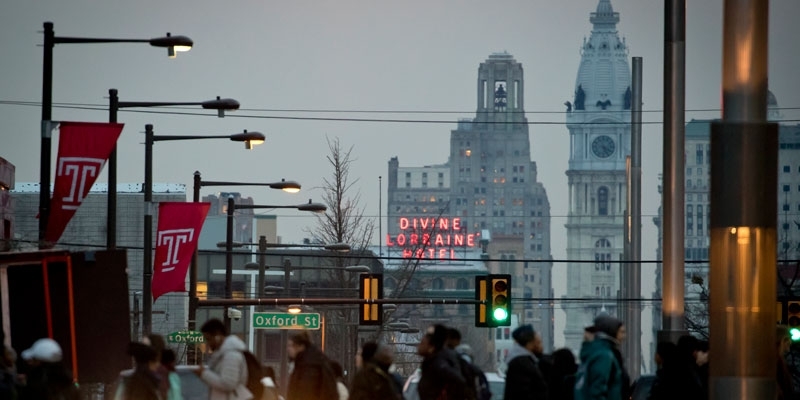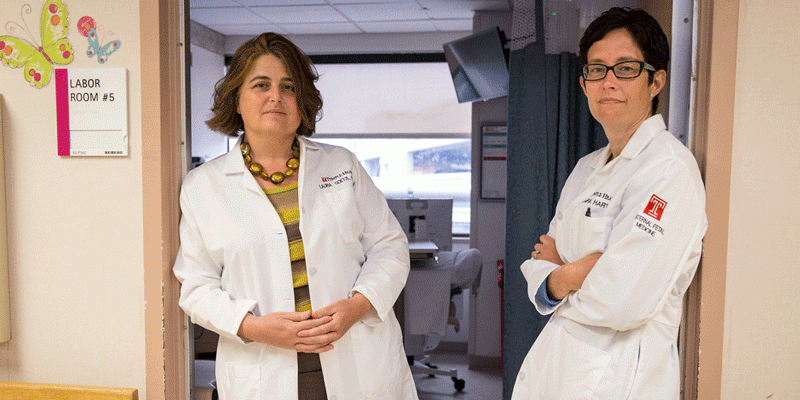Posted April 25, 2018
Proposed center at Temple will offer early childhood education, behavioral health services
The Alpha Center, led by the College of Education, will serve as an anchor for the North Philadelphia community.
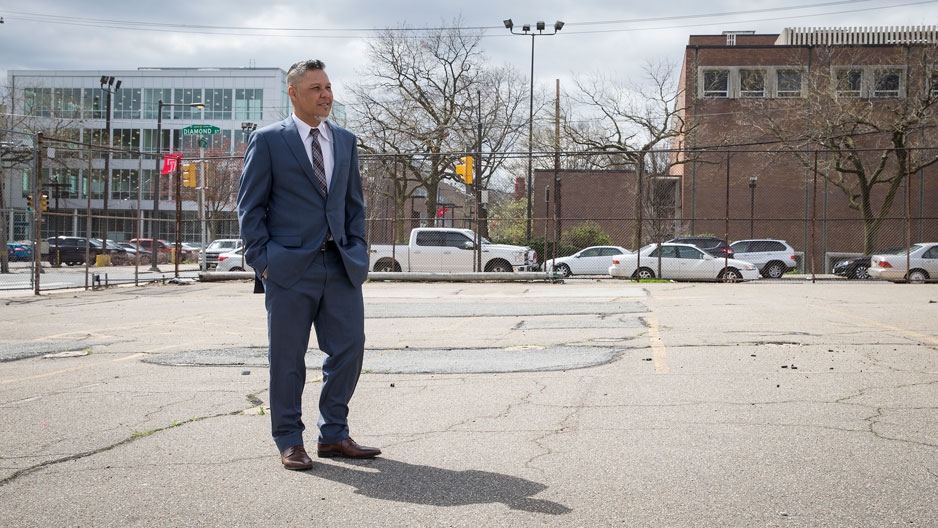
Photography By:
Joseph V. Labolito
College of Education Dean Gregory Anderson, seen here standing at the site of the proposed Alpha Center at 13th and Diamond streets, led the upstart of an early learning center during a previous deanship in Denver and came to Temple in 2013 with a vision for creating a community-focused center at Temple.
Inspired by Temple’s mission of access and affordability, Gregory Anderson arrived in 2013 with a dream and a clear vision to make it reality.
Anderson’s vision for equity and access in education was developed as dean at the University of Denver’s Morgridge College of Education, where he led the upstart of the an early learning center. Upon taking the helm at Temple’s College of Education, Anderson has remained committed to that passion and vision, working to bring it to fruition in the form of a comprehensive community-focused center at the university.
The proposed Alpha Center would be built on a university-owned parcel at 13th and Diamond streets and would unite the wealth of resources and expertise offered by the College of Education in one easily accessible, community-centered location. The center would include an early learning center and offer behavioral health services, programs for people with disabilities, education and workforce development resources.
“I was attracted to an institution that by its very nature is dedicated to the community,” Anderson said of Temple. “My family is from Cape Town, South Africa, and under apartheid, equal opportunity to education was not available. I’ve always been driven by the notion that education is the greatest leveler of opportunity.”
A center of collaboration
Anderson envisions the Alpha Center as a conduit to ensure equal educational opportunity. The proposed center would house an early childhood education program with spaces for 130 children ages 2 to 5, 70 percent to 80 percent of which would be subsidized and reserved for children from the neighborhoods immediately surrounding Temple. The center would also include a community dental clinic staffed by faculty from the Kornberg School of Dentistry; STEM (science, technology, engineering and math) programs for high-school students; and a host of other resources already at the College of Education. The forthcoming North Philadelphia Workforce Initiative is also envisioned to eventually become a part of the offerings in the center.
Kornberg School of Dentistry Dean Amid Ismail said access to dental care in early childhood is crucial for dental health.
“It’s going to be more preventive rather than curative for children, and especially for children who have special needs,” Ismail said. The dental clinic in the Alpha Center will be 5,000 square feet and staffed full time and possibly on evenings and Saturdays as needed, he added.
My family is from Cape Town, South Africa, and under apartheid, equal opportunity to education was not available. I’ve always been driven by the notion that education is the greatest leveler of opportunity."
-- Dean Gregory Anderson, College of Education
The College of Education is home to numerous programs and centers, including the Institute on Disabilities; career and technical education vocational programs; the Intergenerational Center, which provides lifelong learning opportunities and training for senior citizens; and a counseling psychology program that works with local families whose children can benefit from additional support.
Anderson said that although those programs provide direct services to the community, many are underutilized because they are currently spread throughout various locations on campus and can be difficult to access. Bringing them under one roof is intended to make them easier to find and use.
“If it’s a place-based initiative, we need one site so the community will be able to readily access all of the available resources,” Anderson said.
Beyond services and programs that would take place within the Alpha Center, Anderson said the center would also build capacity among other local early childhood education and care providers by offering ample professional development opportunities for their staffs, which are key in increasing providers’ Keystone STAR ratings for the state’s Quality Rating and Improvement System. The College of Education is partnering with Montgomery Early Learning Center, a leading provider of early childhood education, to design its programs.
“This is about partnership and collaboration,” Anderson said. “The goal is for everyone to benefit from the existence of this center.”
The current demand for childcare in North Philadelphia far exceeds the supply, so additional availability of early childhood care is needed in the area. According to a 2016 analysis by the Fund for Reinvestment, the total number of seats available in childcare facilities across Philadelphia accommodates just more than 80 percent of children in need of care, leaving more than 18,000 children without a place to go. In the area surrounding Temple, that gap is even larger.
“This is intended to be cooperative, not competitive,” Anderson said. “It’s not a revenue-generator. It’s an expenditure that fulfills the college’s mission of ensuring access to high-quality education throughout the community.”
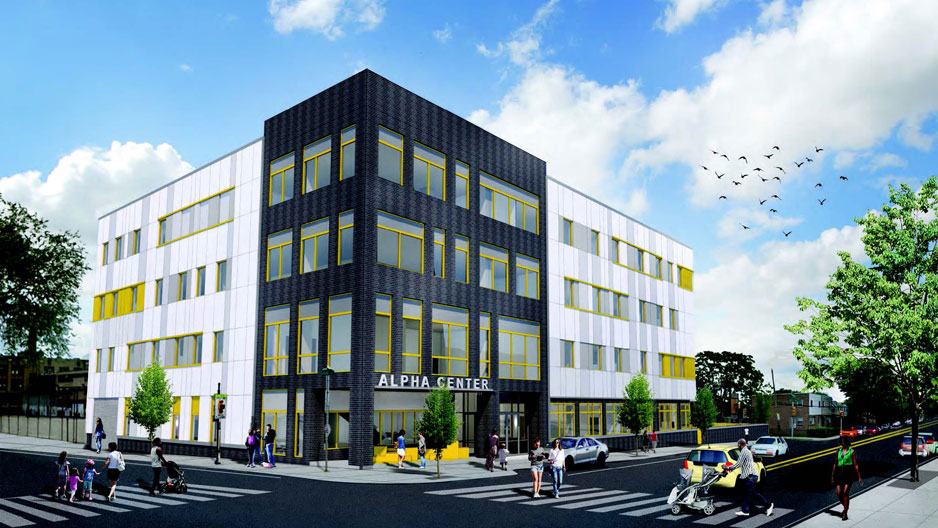
A schematic rendering of the proposed Alpha Center, viewed from Park Avenue
Community support
After several years of planning, the Alpha Center is currently undergoing the City of Philadelphia’s review process. In early May, university leadership presented the plan for the center to the Philadelphia City Planning Commission. The commission has recommended that City Council approve rezoning for the Alpha Center, and City Council is expected to take the project up for consideration in June.
Local leaders have voiced their support for the project.
“We find this project to be highly beneficial for our community,” wrote Donna Richardson, president of the Norris Community Resident Council Inc., which represents families in the Norris Homes adjacent to Main Campus. “The construction of an early childhood learning center will be able to provide much needed services to our families, and therefore we happily support this project.”
The College of Education partnered with the Norris Community Resident Council in the past on educational programming for its residents.
Temple also hosted a community meeting at Berean Presbyterian Church on Diamond Street, near where the proposed center would be built, to discuss the center’s construction.
James Templeton, director of architecture for Temple’s Project Delivery Group, helps oversee the design of all construction projects on Main Campus. He said the university envisions the Alpha Center as a bold building that will still fit in seamlessly with the surrounding neighborhood. The center’s 13th Street side, which would sit across the street from residences, will be built lower than its Park Avenue side to the west to ensure uniformity.
“It’s very sensitive to the context of the neighborhood,” Templeton said. “We’re putting the playground area for the early childhood center on the corner on the Diamond Street side, so there is a softness to the edge. It will be well-landscaped and visible, yet secure.”
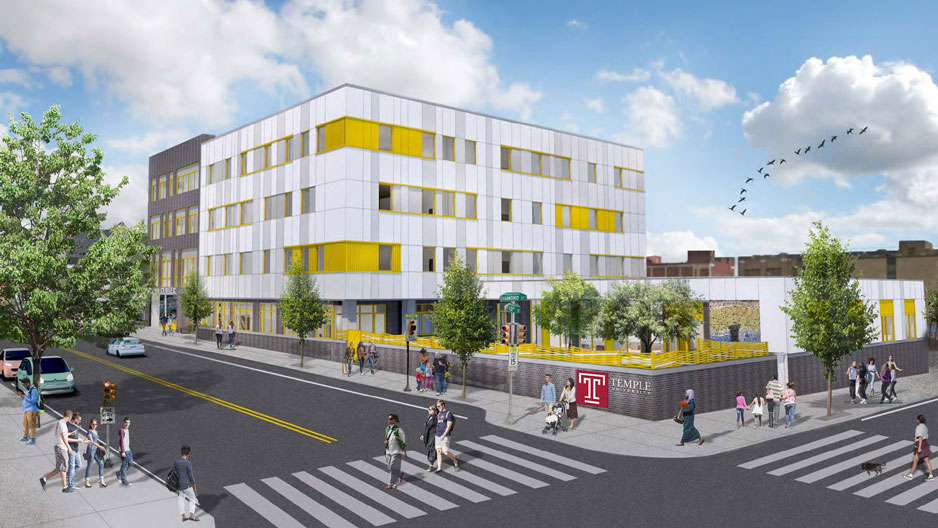
A schematic rendering of the proposed Alpha Center, viewed from 13th and Diamond streets
The center’s main entrance will face Park Avenue to minimize foot traffic near the residences in the immediate area. Members of the community who enter the center will walk into a cafe and lounge area with windows looking out to Diamond Street and be met with stairs to the second floor, where most of the public programming will take place.
On the current plot where the Alpha Center would be built is a fenced-off parking lot.
“We’re going to take this empty hardscape and turn it into a vibrant building,” Templeton said, adding that current renderings of the building are schematic designs that will likely go through additional iterations. “It’s really intended to engage the community and make even just experiencing the building easier for the community.”
